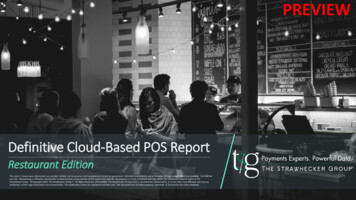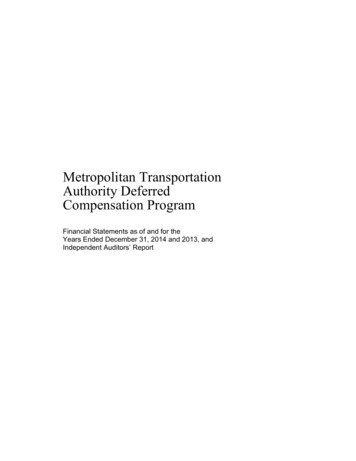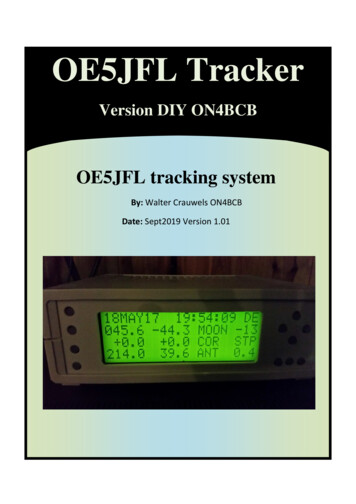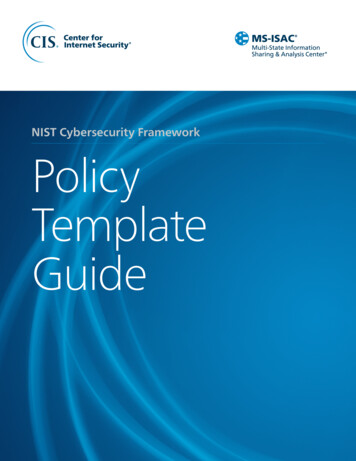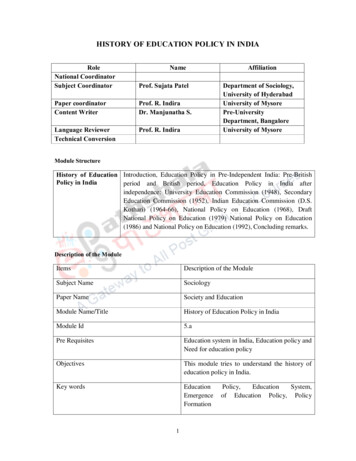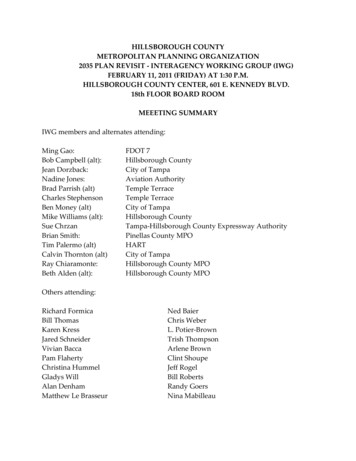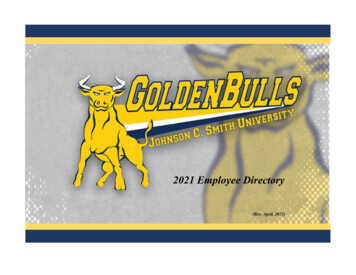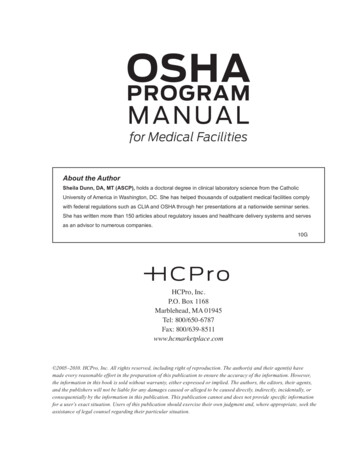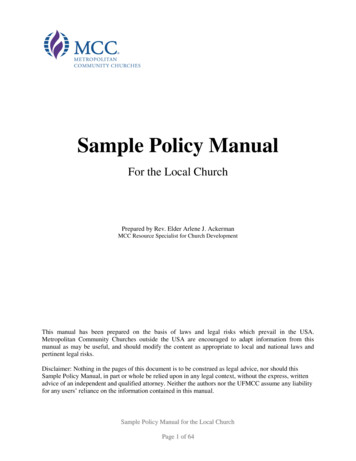
Transcription
Sample Policy ManualFor the Local ChurchPrepared by Rev. Elder Arlene J. AckermanMCC Resource Specialist for Church DevelopmentThis manual has been prepared on the basis of laws and legal risks which prevail in the USA.Metropolitan Community Churches outside the USA are encouraged to adapt information from thismanual as may be useful, and should modify the content as appropriate to local and national laws andpertinent legal risks.Disclaimer: Nothing in the pages of this document is to be construed as legal advice, nor should thisSample Policy Manual, in part or whole be relied upon in any legal context, without the express, writtenadvice of an independent and qualified attorney. Neither the authors nor the UFMCC assume any liabilityfor any users’ reliance on the information contained in this manual.Sample Policy Manual for the Local ChurchPage 1 of 64
AUTHOR’S NOTESChurch leaders can better lead when good, up-to-date policies are in place and utilized, as such free themto focus on the critical rather than the mundane issues of leadership. Without them our leaders are sure towaste time, possibly make mistakes, or fail to focus on what is important.When no or too few guiding policies are in place, leadership’s efficient and effective function issignificantly impaired by the need to address each instance of decision-making on a stand-alone basis.When a subject is dealt with more than two or three times, a well thought through policy should bedeveloped and implemented so the church’s needs can be met in a consistent way and the leaders’ skillsmay be more productively applied.What is offered here is neither a perfect nor an all-inclusive document; instead, it is intended as astarting point for churches creating (or perhaps reviewing) a Policy Manual.Adapt this policy manual to meet your needs. Every church is different – size, culture, theology, style,approach, etc. What is presented here is a generic sample, and what follows is just one way, notnecessarily the best way, to organize or structure your church. I hope that the listing of different subjects,policies, and context information will assist you in thinking through and making decisions about whatshould be in your church policies.Policies are used to explain the how to’s of your church Bylaws. They are sometimes called StandardOperating Procedures. In MCC, the membership approves local church Bylaws and the Board ofDirectors approves the Policy Manual. The Board can also make revisions to the policies as needed.Church Size ConsiderationsSmall Churches – if you rent a space in which to worship, you probably won’t need Facilities policiesrelated to renting out the Social Hall and the like. Hopefully, the time will come when you will have yourown space and it is important to learn what you will need. Delete the sections that don’t currently apply toyour situation and know that you can access the Sample Policy Manual on the MCC website if/when youneed it in the future.TerminologyYour church may apply different processes or use different descriptive language for the various itemsdiscussed in this document. You are encouraged to adapt this Sample Policy Manual to meet yourneeds. I have chosen to write using a Council of Ministry approach to leadership, but I know that somechurches employ the Leadership Council style and still others use different approaches. There aredifferences in staff structure, as well; some churches only have a Pastor on paid staff, while others havenumerous paid staff including an Administrator. Again, adapt the language and sample policies to meetyour requirements.Once your Board has tentatively approved your church Policy Manual, have it reviewed by an attorneywho has the expertise necessary to verify that it complies with the laws of your state and also gives yourchurch the protection it needs.I want to thank all the churches that sent me their Policy Manuals/SOPs. Special thanks go to: Imago DeiMCC, MCC Los Angeles, New Light MCC, MCC of the Spirit, MCC Louisville, St. John the ApostleMCC, Peninsula MCC, MCC of Greater St. Louis, and to all of the pastors who confessed that theirchurches do not have written policies. I also want to express my appreciation to Marsha Warren, Rev. Dr.James Burns, Rev. Dr. Neil Thomas, Barb Crabtree, Rev. Margaret Walker, Rev. Elder Dr. Nancy WilsonSample Policy Manual for the Local ChurchPage 2 of 64
and the Council of Elders, Rev. Dr. Mona West, Irma Bauer Levesque, Rev. Onetta Brooks and especiallyLeah Sloan and Jacquie Ackerman for reviewing and offering their wisdom on this project. Yourfeedback is also welcomed.Rev. Arlene J. AckermanMCC Resource Specialist for Church DevelopmentRevArleneAckerman@MCCchurch.netSample Policy Manual for the Local ChurchPage 3 of 64
Quick Start the Policy ManualCreating a Policy Manual for your church is a major project and can feel overwhelming.Consider the following steps to get you started.Step 1. The Board of Directors establishes a Policy Manual Committee. The committee mightbe made up of the Board of Directors or a separate committee which includes one ortwo Board members and the Pastor.Step 2. The mission of the Policy Manual Committee is to draft a Policy Manual for review andapproval of the Board of Directors.Step 3. The Board and Committee must overwhelmingly agree in principle to the need for awritten and approved Policy Manual.Step 4. The Policy Manual Committee commits to seek input from church leadership prior tothe final proposal going before the Board for approval.Step 5. The Policy Manual Committee will first read and discuss the Introduction and Chapter 1.of the Sample Policy Manual to make sure there is an understanding of concept,purpose and scope.Step 6. Committee members will review the Sample Policy Manual and individually mark whattopics(Chapters/Sections) they think apply to their church now or will apply within thenext three years. Discuss and work as a committee toward consensus regarding whichtopics to include.Step 7. Create subcommittees or work as a committee-of-the-whole to go through each topicarea to see if the policy is worded in a way that works for your church, modify asneeded.Step 8. Once the Policy Manual Committee is in agreement as to the topics and wording of yourdraft Policy Manual, seek input from the Board of Directors and other leadership; makechanges as needed. Repeat this step until you have general consensus.Step 9. When the Policy Manual has been reviewed by leadership and the Board and has generalconsensus it goes to the Board of Directors for official vote. This might be followed bya congregational forum to inform the congregation and answer any questions.Step 10. Have the Policy Manual reviewed by the church attorney.Step 11. Distribute the Policy Manual to all leaders of the church.Step 12. Offer training to ensure leadership understands the policies and how to implement them.Sample Policy Manual for the Local ChurchPage 4 of 64
Metropolitan Community Church(Name of Church)POLICY MANUALApproved (Date)(Name of Church) Board of DirectorsSample Policy Manual for the Local ChurchPage 5 of 64
Table of ContentsChapter 1IntroductionPolicy and PurposeGoals and ObjectivesScopePolicy Approval ProcessManual MaintenanceChapter 2Guiding DocumentsBylawsMission StatementVision StatementCore Values StatementChapter 3Policies & ProceduresA. LEADERSHIPLeadership CovenantDecision Making CriteriaSexual HarassmentPrevention of Child and Youth AbuseConflict of InterestConflict ResolutionPersonal vs. Congregational IssuesDisaster RecoveryInclement WeatherB. MINISTRY/PROGRAMINGPolicy and PurposeMinistry/Programming CoordinationWorship TeamHospitality TeamMusic TeamCongregational Care TeamChildren & Youth Ministry TeamChristian Education TeamJustice TeamAdministration TeamC. LAY DELEGATE(S)General ResponsibilitiesSpecific TasksSample Policy Manual for the Local ChurchPage 6 of 64
At the ConferencePost ConferenceAdditional ResponsibilitiesResponsibilities of the CongregationSummaryD. FACILITIESPolicy and PurposeFacilities CommitteeSafety and ProtectionAlcoholSmokingKeysUse of FacilitiesBuilding Use FeesCustodian FeesWeddings/Holy UnionsSocial Hall RentalSanctuary RentalSound/Media FeesE. FINANCESPolicy and PurposeRole of Treasurer and Assistant TreasurerSystem of Internal ControlsFraud PreventionCounting of moneyAuditGeneral Accounting SystemBudgetingContributionsDesignated GivingDue Unto Others Fund (DUO Fund)Social Justice Fund (SJF) FundBequests and other Legacy GiftsEndowment and MemorialsGift Acceptance PolicyBuilding FundFundraisingCash DisbursementsExpense Reports and Staff ReimbursementCash Management & ReservesGeneral FundDesignated FundsInvestmentsFixed AssetsSample Policy Manual for the Local ChurchPage 7 of 64
Long Term DebtFiscal ReportingDenominational FilingsReports to MembersAvailability of Financial RecordsF. GOVERNANCE – Board of DirectorsPolicy and PurposeElection ProceduresResponsibilities of the Board of DirectorsJob DescriptionsBoard MeetingsExamples of Board of Director CommitteesNominations CommitteeFinance CommitteeGrant Writing CommitteeStewardship CommitteeBuilding CommitteeStrategic Planning CommitteePolicy CommitteeRisk Management CommitteeRisk ManagementInsuranceTypes of InsuranceContracting for ServicesChurch MembershipMembershipReview of MembershipRemovalG. GENERAL ADMINISTRATIONPolicy and PurposePrivacy of InformationRecord RetentionCommunications and MediaExternal MediaAdvertisingCopyright InfringementOfficial WebsiteComputer Information SystemsProhibited Use of Email/InternetPassword ControlsProprietorship of Computer SoftwarePolitical ActivitiesSample Policy Manual for the Local ChurchPage 8 of 64
Chapter 4Employee Handbook(Still in Process)Sample Policy Manual for the Local ChurchPage 9 of 64
Chapter 1IntroductionPolicy and PurposePolicies discussed here are general statements of direction and purpose that allow users toexercise good judgment in the daily operation of the church and promote the efficient use ofresources in the congregation. Policies explain what and why things are done. Procedures explainhow things are done.Policies and procedures are not meant to be restrictive, but to offer parameters within which wemay organize and develop our common life and witness to the Gospel. We hope that these reflectour understanding that we are a faith community grounded in a covenant relationship with Godand with one another that allows all to grow into full maturity. Our policies and procedures willalso reflect our church’s vow to strive for justice and peace and to respect the dignity of everyhuman being.It is hoped that every member will help in the continued development of these covenantagreements that grow out of the Bylaws of our church and Metropolitan Community Churches(UFMCC), our Vision and Mission Statements and Core Values as well as the continued work ofour Board of Directors and Ministry/Program Leaders.This resource is designed to help our leadership with the effective management of our churchand its ministry, with decision-making, and with accountability. Additionally, this tool willcontain information that will facilitate our management of legal risks and help us shield ourchurch and its leaders from possible litigation.The Bylaws of UFMCC and the Bylaws of (Name of Church) govern all policies containedherein. Any policy in conflict with UFMCC or (Name of Church) Bylaws shall be superseded bythose Bylaws. These policies and their application are intended to comply with all applicablefederal and state laws and regulations.This manual supersedes any previous manual and/or written or unwritten policies. (Name ofChurch) reserves the right to establish, administer, change or eliminate policies, guidelines,benefits and procedures at any time.Goals and ObjectivesThis manual is designed to: Help our church leadership with decision-making Help our church leadership with accountability (i.e., trustworthiness, dependability,reliability, independent action, etc.) Help us manage legal risks and protect us and our church from litigationScopeThe (completely spelled out Name of Church) Policy Manual consists of four (4) sections:Chapter 1IntroductionSample Policy Manual for the Local ChurchPage 10 of 64
The Introduction outlines the goals and objectives of the manual along with its scope. It includesinformation on who approves the policies and how the manual is to be maintained.Chapter 2Guiding DocumentsAll policies and procedures are based on a number of key documents: the local church Bylaws,the Bylaws of UFMCC and our local church Vision and Mission Statements and identified CoreValues. These documents or their website links are provided here so that all leaders and staff(paid and volunteer) will have easy access to them. Having a clear understanding of thesedocuments will lay a foundation for understanding and implementing the policies that follow.Chapter 3Policies & ProceduresPolicies and procedures are invaluable for identifying and delegating responsibilities, preservinga consistent level of quality performance, and protecting church leaders and the congregation.Policies will cover broad areas such as leadership, ministry/program, facilities, financesgovernance and general administration. Procedures will explain how things are to be done.Chapter 4Employee HandbookAs a church begins to hire employees, it becomes critical that we develop and maintain anofficial Employee Handbook. This Handbook will address and guide the employee(s) in a broadrange of employment related issues. Employees are required to follow all policies and proceduresfound in the Policy Manual including the Employee Handbook.Policy Approval ProcessAn official policy creation, review, acceptance, and update process has been created so thateveryone in the church can understand the policy process.The life cycle of a policy is:1. A policy need is identified by the congregation, Pastor, Board of Directors orMinistry/Program leaders.2. A draft is created by the staff and reviewed by the Board of Directors; input is soughtfrom those most affected.3. Once in final form it is presented to the Board of Directors for approval.4. The policy is distributed and added to the Policy Manual by the Clerk of the Board ofDirectors.5. The policy may be revised by the Board of Directors at some later date.6. The policy may be rescinded by the Board of Directors at some later date.Manual MaintenanceThe Policy Manual will be reviewed annually—the process will begin in (month) — by the staffand Board of Directors to see if any changes need to be made. All proposed revisions must beapproved or rejected by the Board of Directors and noted in the Board minutes.Revised policy statements will be issued to all manual holders using print or electronic means.The person responsible for maintaining the manual and any policy statements held on theIntranet, local area network or stand-alone PCs will keep a current list of all manual holders.Sample Policy Manual for the Local ChurchPage 11 of 64
All revisions to the Policy Manual will contain the date of the Board of Directors meeting whenthe revision was adopted. The Board’s minutes for that meeting will include completestatements of any new, rescinded or amended (reflecting both removed language and newwording) policies or procedures. A rationale may be noted in the Board minutes.When revisions are issued, all pages for the given chapter or section will be reissued unless thenumbering is not affected and then only the affected pages need be distributed.Sample Policy Manual for the Local ChurchPage 12 of 64
Chapter 2Guiding DocumentsWhen you go about building a house, you first lay out your plan and then build your foundation.Every MCC has a set of church Bylaws, many have Mission and Vision Statements and a list ofCore Values; yet too often church leaders have not read, do not know how to access, or perhapsare not even aware of these foundational articles of the local church.If all of a church’s guiding documents are presented collectively rather than in isolation, theywill better serve the leadership, and ultimately the church itself, by providing the big picture ofour ministry/program.The documents suggested for inclusion are:BylawsThe legal corporate documents of the denomination and local church.MCC (UFMCC) Bylaws%20as%20of%20June%202010.doc(Name of Church) Bylaws(Insert here either the link to or the full text of your local church Bylaws)Mission StatementA short official statement that an organization makes about the work it does and why it does thatwork. It normally includes the organization’s name, a list of what services it provides, for whom,and how.Mission Statement (example from MCCLA)Metropolitan Community Church, Los Angeles (MCCLA) is a prophetic, liberating andprogressing Christian community of faith that honors, values and welcomes all people. Weare rooted in the lesbian, gay, bisexual, trans, queer, and intersex communities. We preacha relevant, vibrant and scripture-based message that embodies and celebrates everyone'sspirituality and sexuality. We challenge each other to make our lives count, as we inviteeveryone to be transformed in mind, body and spirit. From a place of trust, wholeness andholiness, we reach out as the hands, feet, and heart of Christ through acts of justice andcompassion to make a difference in our world. Our Mission is to Accept, Embody, &Declare God’s Love for All.Vision StatementThe statement of what we are becoming that inspires and fosters commitment.Vision Statement (example from MCCLA)Our Vision is to be a Radically Inclusive, Progressive, and Christ-Centered Community.Sample Policy Manual for the Local ChurchPage 13 of 64
Core ValuesThe most cherished beliefs and principles that guide this church.Core Values (example from MCCLA, which is adapted from UFMCC Core Values)InclusionLove is our greatest moral value and resisting exclusion is a primary focus of our ministry.We want to continue to be the conduits of a faith where everyone is included in the familyof God, and where all parts of our being are welcomed at God’s table.CommunityOffering a safe and open community for people to worship, learn and grow in their faithis our deep desire. We are committed to equipping ourselves and each other to do thework that God has called us to do in the world.Spiritual TransformationProviding a message of liberation from the oppressive religious environment of our day orto those experiencing God for the first time is what guides our ministry. We believe thatwhen people are invited to experience God through the life and ministry of Christ, liveswill be transformed.Social ActionWorking to talk less and do more, we are committed to resisting the structures thatoppress people and standing with those who suffer under the weight of oppressive systems,being guided always by our commitment to Global Human Rights.NOTE: MCCLA have other guiding documents, such as Core Understandings and the Statementof Faith that they might well include in this section of a Policy Manual, and they might want toalso include the Vision Statement and Core Values of UFMCC. Each local church might haveother, similar documents to include.Sample Policy Manual for the Local ChurchPage 14 of 64
Chapter 3Policies & ProceduresA. LEADERSHIPLeadership encompasses many aspects including strategic planning, collaboration, delegationand accountability. Each member of the leadership team should have a sense of contributing tothe effectiveness of the team as a whole regardless of, and perhaps even because of, individualdifferences in approach or style.Leadership CovenantLeaders in our church are held to a high standard of mutual accountability.(Name of Church) leadership whether volunteer, appointed, elected, or hired will abide by thefollowing Leadership Covenant:As a church leader I covenant to:1. Be a person of integrity and good character.2. Pray daily for our world, my community, my church and denominational leadership.3. Be truthful.4. Maintain appropriate confidentiality.5. Abide by my commitments to ministry and complete projects/assignments on time,with excellence or ask for help from my team, supervisor or board.6. Attend all ministry/program team meetings unless seriously ill or there is a personalemergency, and to notify my team leader or supervisor, in advance wheneverpossible, of any absence.7. Live my life in a way that demonstrates my faith.8. Follow the policies and procedures as set forth in the Policy Manual.Decision Making CriteriaLeadership will make decisions that are in the best interest of the church and the congregation.All proposals put forth will be viewed in light of the following questions: Will accepting this proposal advance the mission of the church as set forth in theMission Statement? Will we be duplicating the efforts of a church ministry or community service that isalready meeting this need? Will this proposal excite, motivate and encourage the membership to participate andget involved? Would this be a great thing for God?Sexual HarassmentSexual harassment perpetrated by or against any clergy, employee, leader, member of (Name ofChurch), or any other person involved with the church shall not be tolerated. (Name of Church)will comply with all state regulations pertaining to sexual harassment.Sample Policy Manual for the Local ChurchPage 15 of 64
Unwelcome sexual advances, requests for sexual favors or other verbal or physical conduct of asexual nature constitute sexual harassment.Sexual harassment occurs when: Submission to such conduct is made either explicitly or implicitly a term or conditionof an individual’s employment or relationship with the church. Submission to or rejection of such conduct by an individual is used as the basis foremployment or ministry/program decisions affecting such individuals. Such conduct has the purpose or effect of unreasonably interfering with anindividual’s work performance or ability to participate in church activities or has thepurpose or effect of creating an intimidating, hostile or offensive working orworshipping environment.Any instances of sexual harassment will be immediately reported to the Pastor or the ViceModerator of the Board.Sexual Harassment Grievance Resolution Procedure1. Any member, friend, or guest of (Name of Church) who believes he or she hasexperienced any form of sexual harassment as defined above is encouraged to notifythe Pastor or Vice Moderator immediately.2. Immediately following notification, the Pastor or Vice Moderator will request a writtenStatement of Grievance from the complainant. The Statement is to contain details ofthe nature and cause of the grievance, names of those involved, names of witnesses, ifany, and a description of the incident(s) giving rise to the grievance. The Statement isto be signed and dated by the complainant.3. The Pastor or Vice Moderator will appoint a Grievance Review Committee of three (3)uninvolved individuals from a pool selected by the Board of Directors. TheCommittee’s task will be to gather all available information about the grievance,interview all involved persons, prepare a written report of findings, and recommend aresolution within thirty (30) days. The duly appointed chairperson of the GrievanceReview Committee will present the Committee’s findings and proposed resolution tothe Board of Directors for final review and approval.4. After Board of Directors approval, the Pastor or Vice Moderator will present asummary of the Committee’s findings and resolution to the complainant. The Pastor orVice Moderator will be responsible for implementing the resolution.5. If the complaint concerns a MCC clergy person and the complainant is not satisfiedwith the Committee’s findings and/or resolution, he/she may engage the UFMCCClergy Judiciary Process as found on the UFMCC.com website.6. All credible allegations of sexual abuse of minors shall be reported to law enforcementauthorities.Sample Policy Manual for the Local ChurchPage 16 of 64
Prevention of Child and Youth AbuseThe congregation of (Name of Church) is committed to providing a safe and secure environmentfor all children, youth, and volunteers who participate in ministries and activities sponsored bythe church. The following policy statements reflect our congregation’s commitment to preservingthis church as a holy place of safety and protection for all who would enter and as a place inwhich all people can experience the love of God through relationships with others.The following is the policy of (Name of Church) as it relates to the Children / Youth /YoungPeople’s ministry. Children / Youth / Young People are defined as persons below the age of 18: Adult volunteers who work with children and youth shall attend regular training andeducational events provided by the church to maintain current knowledge of churchpolicies and state laws regarding child abuse. Adult volunteers serving with children and youth shall review and sign theLeadership Covenant. Background checks shall be conducted, at the expense of (Name of Church), for allpersons, whether paid or volunteer, who work with children or youth. Initially, fullbackground checks will be conducted for each person. Volunteers who are absentfrom the church for more than four months with no contact shall be re-screenedbefore resuming work with children/youth. The Pastor and the Board Member responsible for Risk Management shall beresponsible for reviewing background checks and determining whether or not personswill be allowed to work with children/youth. The following items appearing onbackground checks shall merit disqualification from working with children: violentcrimes, crimes against children, felony convictions, weapons misdemeanors, orrecurring crimes. All volunteers working with youth or children are required to have been activelyinvolved in (Name of Church) for a minimum of six (6) months. All teachers and advisors must observe the “two adult” rule which requires that therealways be at least two adults, neither related to each other nor from the samehousehold, present when supervising one or more students/children/youth. Volunteers should immediately report any behaviors that seem abusive orinappropriate to their supervisor(s). Minors may participate in church sponsored activities for children and/or youth onlywith written permission from a parent, guardian or caregiver.Conflict of InterestIt is the policy of (Name of Church) that every Board Member, Officer, or Employee shallabstain from involvement, whether by voting or otherwise participating in the decision-makingprocess, in those situations where they have or may have a conflict of interest.A conflict of interest is deemed to exist where: The person has a substantive interest, whether direct or indirect, in the matter at handor the other party(ies) involved; The person is either a director, officer, or employee of the other party(ies) involved; orSample Policy Manual for the Local ChurchPage 17 of 64
The person’s spouse, children, parent, or siblings are in substantive relationships withthe other party (ies) involved.In those situations where a conflict of interest does exist or has the potential to exist, any BoardMember, Officer, or Employee aware of such shall notify the Pastor or a member of the Board ofDirectors. More information is available in section titled, “Governance – Board of Directors”.Board Members, Officers, and Employees are encouraged to participate actively in communityand professional activities. Because Board Members, Officers, and Employees may not alwaysbe fully aware of all interagency involvement(s), they should inform the Pastor of any intentionsto participate in any activity that could potentially give rise to a conflict of interest.Conflict ResolutionIt is important to recognize and manage conflict in a healthy manner. Conflict is inherent in anyorganization. As a growing, thriving church, it is expected that (Name of Church) will from timeto-time experience internal conflict. Conflict can be good or bad, healthy or unhealthy,constructive or destructive.(Name of Church) recognizes that healthy resolution of church conflict requires that thoseinvolved value one another as human beings, put forth the effort required to understand opposingpoints of view, and mutually agree that the good of the congregation is paramount. Members areto be committed to handling conflict in a mature, loving and constructive manner, and are toexpect the same of church leadership and staff.Healthy Conflict(Name of Church) recognizes that healthy conflict is necessary to keep an organization mindfulof and focused on its mission. Healthy conflict is that in which members deal with their issuesup-front and talk directly to those with whom they disagree. They bring substantive evidencewith their particular viewpoints and their demands are reasonable. They present their viewpointsas clearly supportive of the mission of the church. They clearly have a deep love for the church,love and respect for the leadership of the church, and are honorable in sharing their viewpoints.They do not make personal attacks on others. They are introspective and concerned that theyhave correct information. They view themselves as working with the church leadership to findpeaceful, loving solutions to the issue at hand for the good of all people concerned. Once a voteis taken on an issue, they support the witness of the body evident in the vote, whether or not theyare/were in agreement with the decision. They continue to be constructive and positive in theirwork for the common good of the church.Unhealthy ConflictUnhealthy conflict is that in which one or more members, based on non-substantive evidence,makes insatiable demands, usually attacking the person or performance of others. Any suchunhealthy conflict has the potent
The Policy Manual Committee commits to seek input from church leadership prior to the final proposal going before the Board for approval. Step 5. The Policy Manual Committee will first read and discuss the Introduction and Chapter 1. of the Sample Policy Manual to make sure there i
